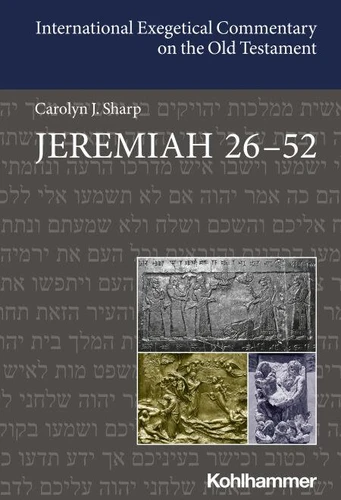Jeremiah 26 - 52
Par : , , , ,Formats :
Disponible dans votre compte client Decitre ou Furet du Nord dès validation de votre commande. Le format ePub est :
- Compatible avec une lecture sur My Vivlio (smartphone, tablette, ordinateur)
- Compatible avec une lecture sur liseuses Vivlio
- Pour les liseuses autres que Vivlio, vous devez utiliser le logiciel Adobe Digital Edition. Non compatible avec la lecture sur les liseuses Kindle, Remarkable et Sony
 , qui est-ce ?
, qui est-ce ?Notre partenaire de plateforme de lecture numérique où vous retrouverez l'ensemble de vos ebooks gratuitement
Pour en savoir plus sur nos ebooks, consultez notre aide en ligne ici
- Nombre de pages469
- FormatePub
- ISBN978-3-17-040082-5
- EAN9783170400825
- Date de parution22/11/2021
- Protection num.Digital Watermarking
- Taille3 Mo
- Infos supplémentairesepub
- ÉditeurKohlhammer
Résumé
This commentary illumines Jer 26-52 through historical, literary, feminist, and postcolonial analysis. Ideologies of subjugation and resistance are entangled in the Jeremiah traditions. The reader is guided through narratives of extreme violence, portrayals of iconic allies and adversaries, and complex gestures of scribal resilience. Judah's cultural trauma is refracted through prose that mimics Neo-Babylonian colonizing ideology, dramatic scenes of survival, and poetry alight with the desire for vengeance against enemies.
The commentary's historical and literary arguments are enriched by insights from archaeology, feminist translation theory, and queer studies.
The commentary's historical and literary arguments are enriched by insights from archaeology, feminist translation theory, and queer studies.
This commentary illumines Jer 26-52 through historical, literary, feminist, and postcolonial analysis. Ideologies of subjugation and resistance are entangled in the Jeremiah traditions. The reader is guided through narratives of extreme violence, portrayals of iconic allies and adversaries, and complex gestures of scribal resilience. Judah's cultural trauma is refracted through prose that mimics Neo-Babylonian colonizing ideology, dramatic scenes of survival, and poetry alight with the desire for vengeance against enemies.
The commentary's historical and literary arguments are enriched by insights from archaeology, feminist translation theory, and queer studies.
The commentary's historical and literary arguments are enriched by insights from archaeology, feminist translation theory, and queer studies.



